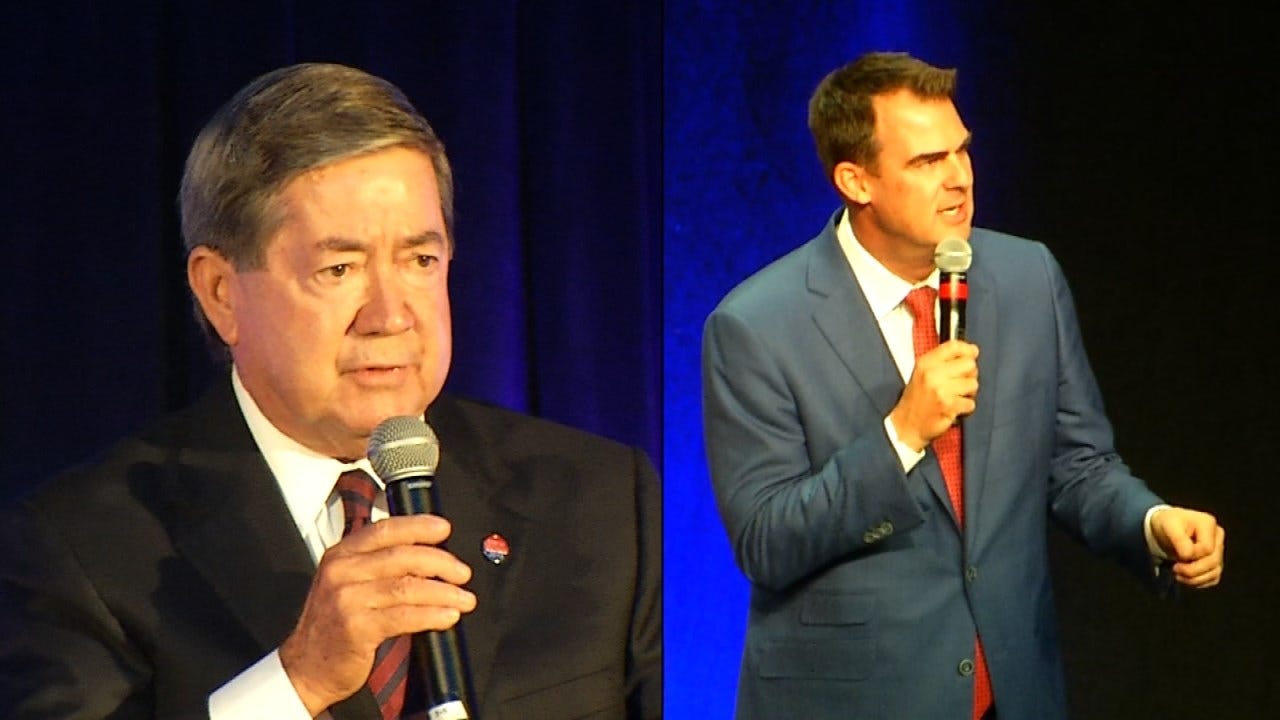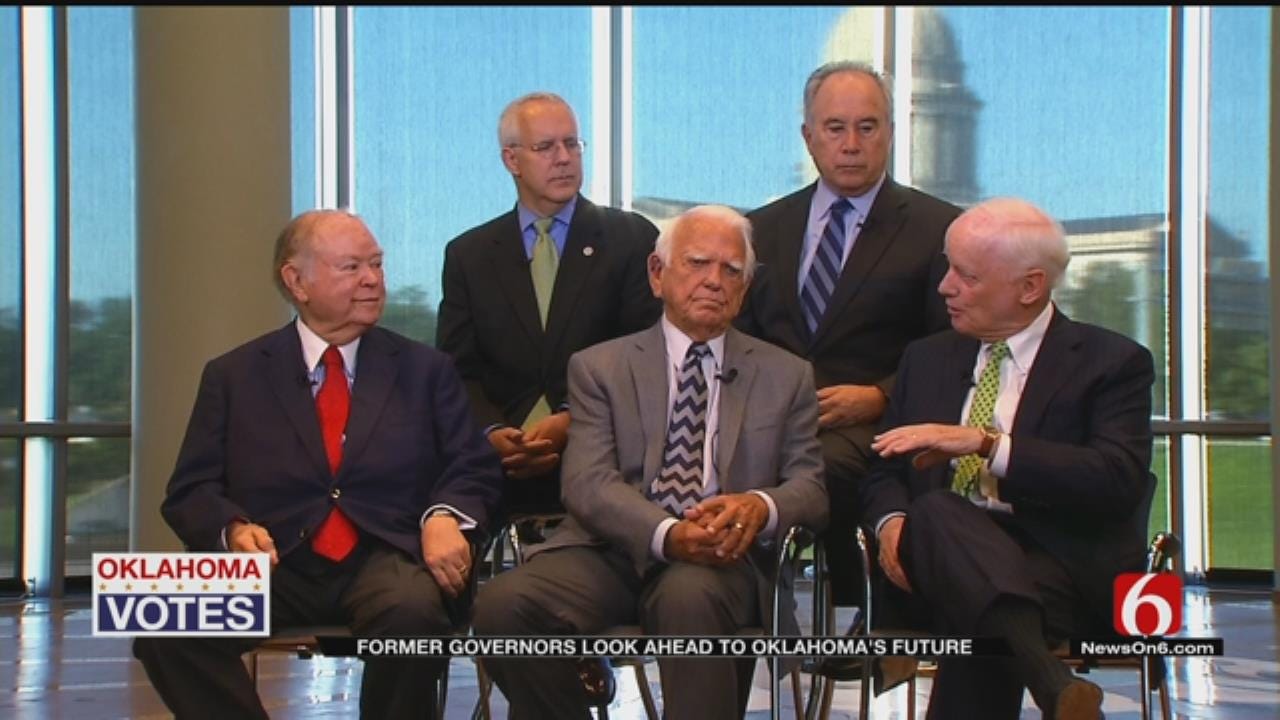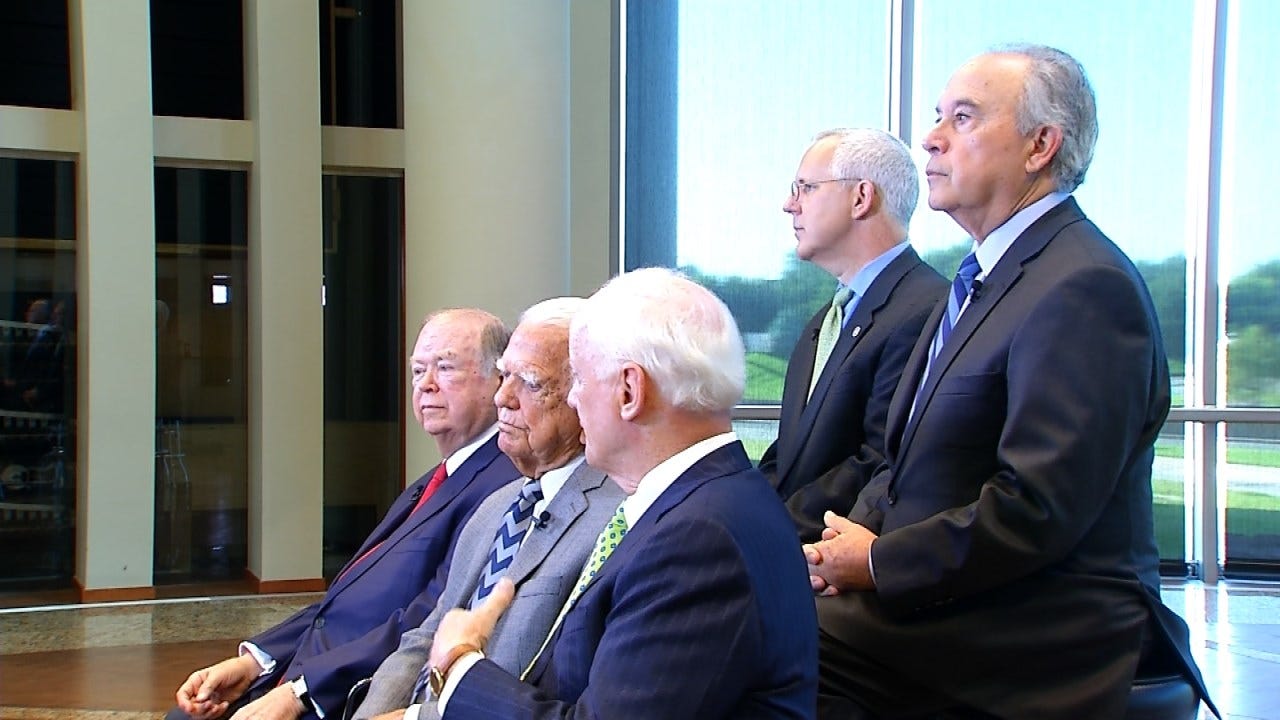Former Governors Discuss Oklahoma's Future
<p>Next Tuesday, November 6, Oklahomans will elect a new governor, and whoever wins - Drew Edmondson, Chris Powell, or Kevin Stitt - will face some serious challenges.</p>Thursday, November 1st 2018, 2:58 pm
Next Tuesday, November 6, Oklahomans will elect a new governor, and whoever wins - Drew Edmondson, Chris Powell, or Kevin Stitt - will face some serious challenges.
No one knows that better, and perhaps no one knows better how to handle those challenges than the state's past governors. There are five former Oklahoma governors still living, and they all sat down last month for a group interview at the Oklahoma History Center for News On 6.
The four Democrats and one Republican have helped shape recent state history in the way they responded to crisis:
For David Boren (1975-1979), it was a crisis of confidence. Boren took office with the nation still reeling from the Watergate scandal, and political conditions in Oklahoma not much better.
"We were having widespread and well-publicized investigations into possible corruption in state government," recalled Boren, "so it was a double whammy for Oklahoma - people really had lost their confidence in government."
For George Nigh (1979-1987), it was the oil bust, brought on in his second term by the savings and loan crisis.
"It was tough...tough, following [the collapse of] Penn Square Bank," Nigh stated, "because everything we said we wanted to do...it wasn't there, it was gone."
For David Walters (1991-1995), it was a family crisis, the loss of his son to a drug overdose.
"Everybody deals with personal challenges when they're in office," Walters explained, "and trying to translate that somehow into good public policy -- and deal with those tragedies at the same time -- is always a big challenge."
For Frank Keating (1995-2003), it was the crisis that brought the state and nation face to face with domestic terrorism.
"The most agonizing moment...the most challenging moment of my service," Keating reflected, "was the Oklahoma City bombing, that occurred probably two months after I came into office."
For Brad Henry (2003-2011), it was a national economic crisis during his second term.
"At the end of 2007, through 2008, 2009, the Great Recession," Henry said, "and that was an extremely challenging time for us in state government."
Read Related: Former Oklahoma Governors Look Back At Their Toughest Challenges In Office
They all were challenging times, but they gave these men a unique understanding of what it will take to overcome the next crisis at the Capitol, whatever it might be:
- Healthcare. Access to quality healthcare is a serious problem in rural Oklahoma and, with hospitals shutting down, it's only getting worse.
- Corrections. Oklahoma has the highest incarceration rate in the country and has run out of prison space; criminal justice reforms have, so far, been too weak to make a difference.
- Education. Despite the Legislature approving the revenues for a long-awaited teacher pay raise last spring, the state's teacher shortage persists and test scores are down.
But these former governors, with 32 combined years of state leadership, say, more than any of these single issues, the challenge for the next governor, and the legislative leaders he'll work with, is to be willing to invest in each one.
Read Related: Former Governors Look Ahead At The Greatest Challenge The Next Governor Will Face
"There's just no way you have good education, good infrastructure, good healthcare...or anything else that's important, really, for the quality of life in our state," said Gov. Boren, "unless we are also willing to pay for it."
But with investment, there must also be reform, the men say, and a willingness to push for potentially unpopular reforms, such as consolidating some of Oklahoma's 500-plus school districts.
"Have 77 administrative districts," stated Gov. Keating, "but get rid of the bureaucracy and put money in the classroom."
These sorts of decisions, they say, will take political courage.
"You're gonna get a lot of criticism, a lot of popularity's gonna be lost, and you may lose an election," Gov. Walters said, "but that's what has to happen for this state to advance "
There's widespread agreement among the former leaders that that sort of leadership has been missing in recent years.
"These problems that we all talk about can be resolved, they're not insurmountable, if you have the right leadership," said Gov. Henry, "and that requires someone, in my view, who is a uniter, and who can bring people together."
All agree that conditions at the Capitol are much different today than when they were in office. They say some of the extreme partisanship that's so common now is, to some extent, the result of term limits, and the fact that many lawmakers are inexperienced and rely, not on relationships, but on the collective weight of the caucus to get things done.
"It's just a much less experienced group," noted Gov. Henry, "and I see them making some of the same mistakes that we made fifteen years ago; there's just no institutional memory in the Capitol anymore."
Gov. Keating, the lone Republican in the group, agrees that expanding term limits could help, but says we also need to encourage higher quality candidates to run for office - the state's best and brightest.
"We want men and women of both parties, of good will and intelligence, who've read deeply and traveled widely to run for office," Gov. Keating stated. "I mean, we all turn cynical when we think a bunch of boobs are running the place."
Gov. Nigh says, today's hyper-partisans could learn an important lesson from the legislators of his day.
"We might have said, 'Okay, here's Keating, he's a Republican, I'm a Democrat'," Gov. Nigh related, "but once we get in office, we need to be buddies, we need to work together."
The state Legislature has always had divisions - urban vs. rural, east vs. west, but they say the Republican-Democrat divide of today is more alarming because it prevents the leadership of the minority party from being a full partner in the state government.
"That's one of the things that's changed," said Gov. Boren, "and that's one of the things that concerns me more than anything else is this kind of fragmentation that is occurring...I think we've got to get together and think as Oklahomans and Americans first."
"Most everybody knows what the solutions are for education and criminal justice reform, infrastructure funding and healthcare - those solutions have been tried and tested in many, many other states," said Gov. Walters. "It's ideology that keeps us from being able to implement those, and it's too bad."
And that's why, all agree, this is a time when Oklahoma needs someone who can, and will, work both sides of the aisle, and consider the needs of all Oklahomans.
"A governor should represent all 77 counties," said Gov. Nigh. "You might come from an area, but once you get to be elected governor, your area is 77 counties."
It's a simple concept, they say - work across party lines, and think about what's best for Oklahoma.
"Because if the USS Oklahoma goes down, we all go down together, Republicans and Democrats alike," said Gov. Keating, "and last people laughing will be the Texans."
More Like This
November 1st, 2018
January 2nd, 2025
September 29th, 2024
September 17th, 2024
Top Headlines
January 28th, 2025
January 28th, 2025
January 28th, 2025















